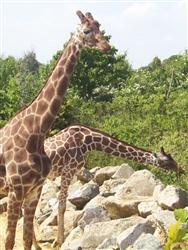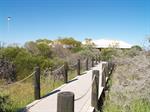Contribute to the environment with capability and pride
This flexible certificate level course in Environmental Science enables you to choose a course to suit your interests and requirements.
There are four core modules of Introduction To Ecology, Conservation and Environmental Management, Environmental Assessment and Wildlife Management. You then choose two elective modules of your choice.
- Build a solid foundation knowledge of Environmental Science

- Give yourself a head start when applying for jobs in the Environmental field
- Gain a greater understanding of ecological processes and the interconnectedness of species and habitats.
COURSE STRUCTURE: This course consists of 6 modules.
START DATE: Start at anytime to suit YOU.
COURSE DURATION: 600 hours
COURSE CONTENT: To obtain this certificate you must satisfactorily complete all assignments and pass an exam in each of the following six subjects. (Click on modules for more detail)
There are four Compulsory Modules -
Environmental Assessment
Wildlife Management
Introduction to Ecology
Conservation and Environmental Management
You then choose two elective modules from the list given below -
More Information on the Modules -
INTRODUCTION TO ECOLOGY (BEN101)
 This subject has 7 lessons as follows:
This subject has 7 lessons as follows:
- Ecosystems and Populations
- The Development Of Life
- Animals, Parasites and Endangered Species
- Fungi, Tundra, Rainforests and Marshlands
- Mountains, Rivers and Deserts
- Shallow Waters
- Ecological Problems
WILDLIFE MANAGEMENT (BEN205)
The course is divided into nine lessons as follows:
- Introduction To Wildlife Management
- Wildlife Ecology
- Wildlife Habitats
- Population Dynamics
- Carrying Capacity
- Wildlife Censuses
- Wildlife Management Techniques
- Wildlife Management Law And Administration
- Wildlife Management Case Study Research Project
CONSERVATION AND ENVIRONMENTAL MANAGEMENT (BEN201)
 This course has 8 lessons as follows:
This course has 8 lessons as follows:
- An Introduction To Ecology
- A Perspective On Environmental Problems
- Pollution and Industry Effects On The Environment
- Water and Soil
- Vegetation Conservation and Management
- Animal Conservation and Management
- Marine Conservation and Management
- The Future
ENVIRONMENTAL ASSESSMENT (BEN 301)
There are 8 lessons in this course as follows:
- Types of Employment for Environmental Scientists
- Introduction to Environmental Assessment
- International Environmental Law
- Domestic Environmental Law
- Types of Environmental Assessments
- The Design and Process of Environmental Assessment
- Writing Environmental Reports
- Research Project - The student will carry out a small environmental assessment and write it up as a professional report.
Examples of elective modules -
TREES FOR REHABILITATION (BHT205)
There are ten lessons are as follows...
- Approaches To Land Rehabilitation
- Ecology Of Soils And Plant Health
- Introduction To Seed Propagation Techniques
- Propagation And Nursery Stock.
- Dealing With Chemical Problems
- Physical Plant Effects On Degraded Sites
- Plant Establishment Programs
- Hostile Environments
- Plant Establishment Care
- Rehabilitating Degraded Sites
BOTANY I (Plant Physiology and Taxonomy) (BSC104)
The course is divided into 10 lessons as follows:
- Taxonomic Classification of Plants
- Cells and Tissues
- Specific Vegetative Parts of a Plant
- Flowers and Fruit
- Seed and the Developing Embryo
- Photosynthesis and Growing Plants
- Respiration
- The Role of Water
- Movement of Water and Assimilates through a Plant
- The Effects of Tropisms and Other Growth Movements
 EARTH SCIENCE (BEN204)
EARTH SCIENCE (BEN204)
There are nine lessons in this module as follows:
- Structure and Forces
- Rocks and Minerals
- Surface Changes
- The Oceans
- Air and Weather
- The Greenhouse Effect
- Global Weather Patterns
- Geological Time
- Modern Environmental Issues
ECOTOUR MANAGEMENT (BTR101)
There are nine lessons in this module as follows:
- Nature and Scope of Ecotourism
- Management Issues
- Industrial Destinations
- The Tour Desk/Office
- Accommodation Facilities
- Catering Facilities
- Legal Considerations
- Safety
- Planning an Ecotourism Activity
WILDLIFE CONSERVATION (BEN206)
There are ten lessons in this module:
- Introduction to Wildlife Conservation
- Recovery of Threatened Species
- Habitat Conservation
- Approaches to Conservation of Threatened Species
- Vegetation Surveys
- Fauna Surveys
- Marine Conservation
- Planning for Wildlife
- Management
- Wildlife Conservation Project
Why Study with ACS?
Design your own learning pathway.
Study at your own pace, from anywhere, at any time.
Receive prompt, expert support from our team of committed and friendly tutors.
Your learning is our priority. We are flexible and adaptable to meet your educational needs!
Enrolling is easy - just go to the top of this page and select your study method and payment option.
If you have any questions about studying with ACS, or want to know more about any of our courses, get in touch with our specialist tutors today. They will be happy to answer your questions and look at different study options to fit in with your goals.